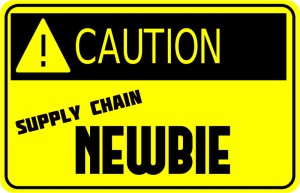Quick, tell me everything you know about supply chain! Okay, maybe not everything you know. I’m pretty sure that would take years with the experience some of you have. Maybe more like the CliffsNotes version. Why? Well, I’m new to the supply chain industry and need to get up to speed in a hurry. I’ve just joined the Kinaxis team as the social media and public relations manager, filling in for the next 14 months, and while I’ve got a great handle on the functions of my role, doing it in the supply chain context is something entirely new for me. I have to admit that up until recently (pretty much the day before my first interview) I hadn’t really given much thought to supply chains. Sure, I had a basic idea of what they were. Oxford Dictionaries defines a supply chain as “the sequence of processes involved in the production and distribution of a commodity,” but as I’ve quickly come to realize, that short little sentence doesn’t begin to scratch the surface of the vast and oftentimes perplexing concepts that encompass supply chain management. The past few weeks I’ve been studying up on supply chain. Here are just a few things I’ve learned so far:
- A control tower isn’t just the thing at the airport that directs the planes. Having a centralized hub to capture, analyze and use supply chain data can make a huge difference in enhancing visibility for decision making.
- Holy acronyms Batman! ERP, S&OP, MPS - there’s one for EVERYTHING and it seems to be assumed everyone knows what they all mean. Thank goodness for Google!
- Forecasting is a lot like trying to predict the weather. You have a general idea of what things will look like based on past trends, but then Mother Nature decides to throw a massive wrench (or snowstorm!) into the mix and everything changes. Hopefully your current system allows you to respond quickly!
- Inventory planning is the reason why those items I ordered from Amazon arrived (well that and the mail carrier). And poor inventory planning is why they were three weeks late! Supply chains impact nearly every aspect of my life – and I didn’t even know it! It really hammers home the message that proper supply chain management can have a huge effect on ensuring your business runs smoothly, and that your customers remain happy.
- Supply chain management is actually pretty fascinating! But you probably already knew that. There are so many nuances and intricacies, and the impact of doing a good job in supply chain management (or a poor one) can have a far reaching effect. What’s not to get excited about?
I know there’s so much more to learn, but thankfully I’m surrounded by some incredibly knowledgeable (and friendly) people who are happy to strike up a conversation about supply chains. I even learned a little more about the importance of supply chain collaboration at the water cooler today!





Discussions
Good luck!
First, I wish you the best of luck in your new position.
Second, you started with a control tower. I believe you should learn the basics first.
A supply chain is in place to get products to the customer quickly, and give value to your customer beyond the customer's expectations.
You begin with the supplier who ships to a manufacturers warehouse or third party logistics (3PL) provider. The manufacturing firm makes and buys products to manufacture consumer goods. The manufacturer then ships the goods to a third party logistics (3PL) provider or direct to the customer. There are variations to these basics, of course, but this is the standard supply chain.
Key elements: partnerships, communication, collaboration, service level agreements, metrics or KPIs, IT systems, EDI, TPI (those acronyms!), ERP, TMS, WMS, and YMS. If you need assistance with these acronyms contact me.
I am trying to reply you from easier understanding viewpoint to define the concept of Supply chain management. Hope it could be help you a little bit:
1. Function: supply chain management is mainly managing the PROCESSES that start at: Raw materials purchasing, Raw materials storing, Raw material input production and become into finished product, Finished production storing, Finished product distributing and delivering to the customer. The relevant departments are Purchase, Warehouse, Planning, Production, Sales, etc..
2. Flow: three flows from upstream to downstream, first flow is INFORMATION flow, second flow is MATERIAL (or PRODUCT) flow, third flow is FUND (or CASH) flow. The relationship between the three flows is that INFORMATION flow lead MATERIAL flow; MATERIAL flow is loaded FUND flow, when MATERIAL is flowing, its FUND is flowing simultaneously.
3. Drive: DEMAND is driving the supply chain, supplying material and/or product along the chain shall be according to the DEMAND. It is easy to say but difficult to do when operating the supply chain. There are many strategies and tactics (or methods) are belonged to supply chain management knowledge. There are plenty rooms to improve under DEMAND management umbrella, that could increase Customer service level and reduce operation cost. From this point of view, supply chain could be called as Demand & supply chain.
4. Information Technology: without information technology, modern supply chain concept can not realized.
Thanks
Leave a Reply